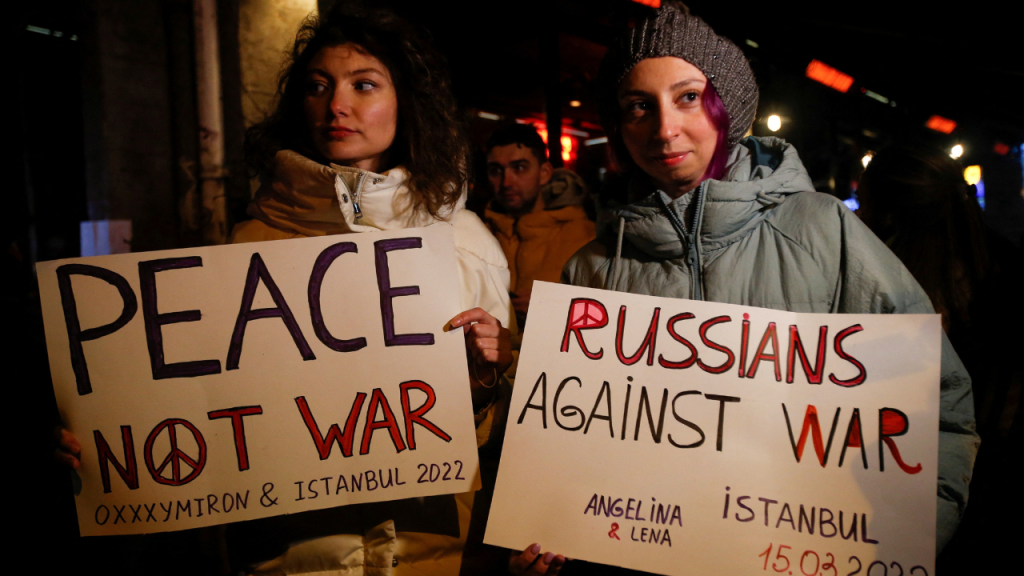Many Russians who sought refuge in Turkey amidst the Ukraine war have faced challenges with obtaining residency permits and rising living costs, leading many to leave for other countries. The number of Russian residents in Turkey dropped from 154,000 to 96,000 due to difficulties in obtaining residency permits and Turkey’s economic challenges. Tens of thousands of Russians who fled to Turkey following Moscow’s invasion of Ukraine have since moved on to countries like Serbia and Latin America, where they face fewer restrictions and more stability. Many Russians initially came to Turkey to shield themselves and their businesses from Western sanctions imposed on Moscow. However, they faced difficulties with residency permits and soaring costs, prompting many to leave.
The number of Russians with Turkish resident permits dropped to 96,000, down by more than a third from 154,000 at the end of 2022, due to struggles in obtaining residency permits since early 2023. Many Russians have also left Turkey due to the soaring costs, with Turkish inflation hitting 70% last month. Difficulty in basic banking in Turkey as a result of the sanctions has also been a significant factor in driving Russians to leave. Some Russians, like IT sector employee Dmitri, left Turkey after his residency application was rejected without explanation in January 2023, moving to Montenegro for more stability. Turkey’s Presidency of Migration Management stated that departures of Russians were not only linked to residency permits, but also affected by various political, economic, and sociocultural factors.
While the Kremlin has not released data on the wartime exodus, reports indicate that around 800,000 Russian citizens relocated abroad since the invasion of Ukraine. Turkey, which maintained visa-free travel for Russians and did not join Western sanctions against Russia, saw an influx of Russian newcomers initially but has since experienced a decline in activity. The number of companies established with Russian capital in Turkey fell from 140 in 2022 to 68 in 2023. Many Russian migrants are now moving to countries like Serbia, Montenegro, and even Latin American countries due to economic challenges in Turkey. Some wealthier Russians have acquired Turkish citizenship through home purchases, but bureaucratic troubles have proven too onerous for many, prompting them to leave the country.
Kirill Alekseev, a Russian politician who came to Turkey in March 2022, decided not to reapply for a residence permit after learning it would cost $2,000, deeming it too expensive to stay in Turkey. Instead, he applied for a German “humanitarian residence permit” and has lived in Nuremberg for a year. Some Russians have been able to acquire Turkish citizenship through home purchases of at least $400,000, surpassing Iranians and Iraqis as the biggest foreign buyers in the last two years. However, many like Eva Rapoport, who worked for the ‘Ark Project’ helping Russians in Istanbul, have also joined the exodus from Turkey due to uncertainties around permit extensions and an increasingly hostile system towards foreigners. Pressure on human rights in Turkey, such as freedom of assembly, has also been a factor in pushing Russians to leave for other countries.
Overall, the challenges of obtaining residency permits, rising living costs, and bureaucratic troubles have driven many Russians who initially sought refuge in Turkey to leave for other countries like Serbia, Montenegro, and Latin America. The economic challenges in Turkey, combined with uncertainties around permit extensions and increasing hostility towards foreigners, have prompted many to seek more stable and welcoming environments elsewhere. Despite the initial influx of Russian newcomers in Turkey, the number of Russian residents has steadily declined, with many choosing to move to countries with fewer restrictions and more favorable conditions for both personal and business activities.


